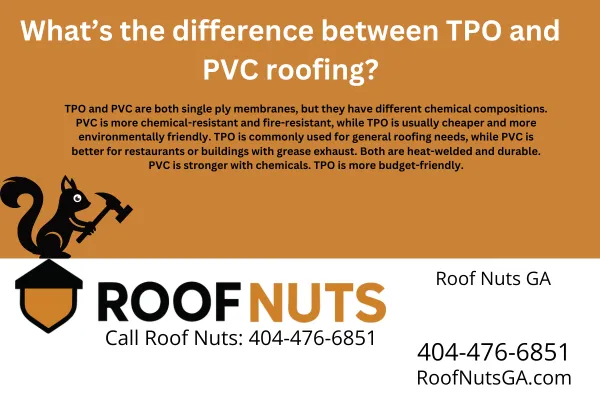
What’s the difference between TPO and PVC roofing?
TPO vs. PVC Roofing: What’s the Difference and Which One Is Right for Your Building?
TPO and PVC are both single-ply roofing membranes, but they serve different needs based on their materials, durability, and performance.
Here's a quick comparison to help you decide which is right for your building:
Feature TPO PVC Material Thermoplastic polyolefin (polypropylene + rubber) Polyvinyl chloride Cost More budget-friendly More expensive Environmental Impact More eco-friendly, recyclable Less eco-friendly Fire Resistance Moderate Excellent Chemical Resistance Low High Grease Resistance Not recommended for greasy environments Best choice for restaurants, kitchens Installation Heat-welded Heat-welded Durability Strong UV and puncture resistance Strong chemical and fire resistance
Which is better for restaurants and food service roofs?
PVC is the better choice.
PVC resists oils, fats, and grease that vent from commercial kitchens. Over time, these substances can break down TPO membranes. If you're roofing a restaurant, food processing facility, or anything with grease exhaust—go with PVC.
Is TPO good for most commercial buildings?
Yes.
TPO is commonly used for:
Warehouses
Retail stores
Office buildings
Schools and churches
TPO is durable, reflective (helps reduce cooling costs), and offers a strong return on investment for general commercial use in Georgia’s hot, humid climate.
How long do TPO and PVC roofs last?
TPO: 15–25 years
PVC: 20–30 years
Proper installation and maintenance are key to hitting the high end of these lifespans.
FAQs
Is TPO or PVC better for hot climates like Georgia?
Both perform well in heat, but TPO reflects more sunlight, which can help reduce cooling costs. That makes it popular in hot, sunny areas like Atlanta, Macon, and Savannah.
Can you walk on TPO or PVC roofs?
Yes, but use walk pads for frequent foot traffic. Both materials can be punctured if misused.
Do both require insulation underneath?
Yes. TPO and PVC systems are typically installed over insulation boards to meet energy codes and improve performance.
Which is easier to repair?
Both are heat-weldable and easy to repair with proper tools. However, repairs must be done by a trained contractor.
Need help choosing the right roof system?
If you own a building in Atlanta, Augusta, Columbus, Macon, Savannah, Athens, Sandy Springs, Roswell, Johns Creek, or Warner Robins, the pros at Roof Nuts can help you decide.
📞 Call Jay or Blake today at 404-476-6851
🔗 Visit RoofNutsGA.com to schedule your free consultation